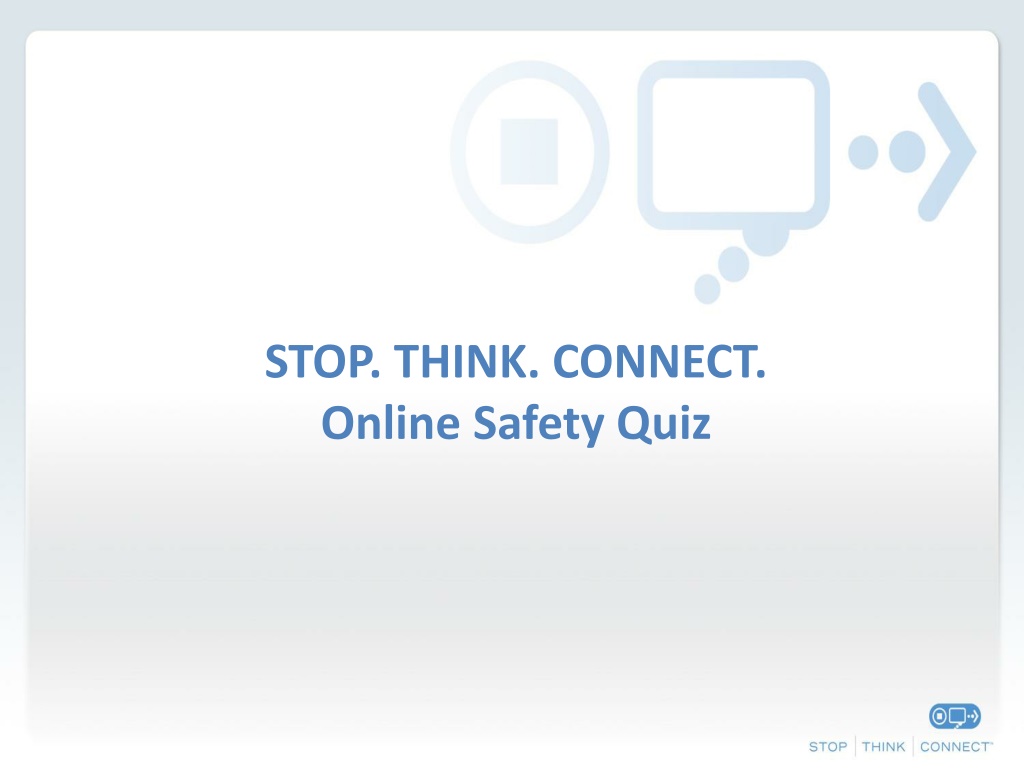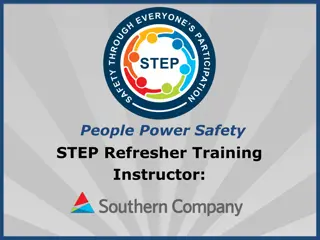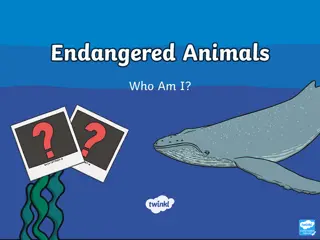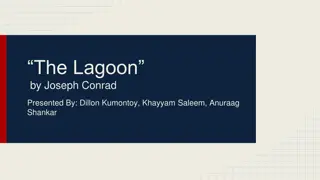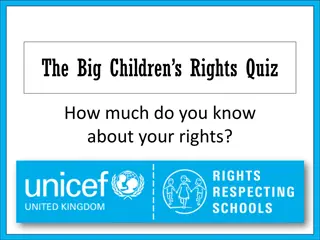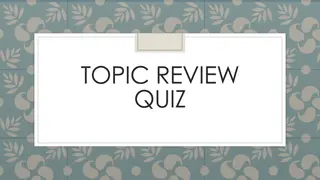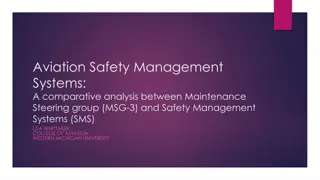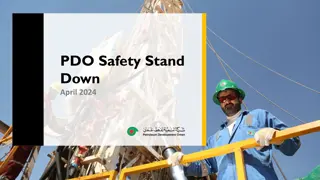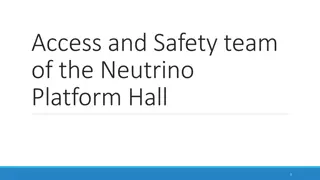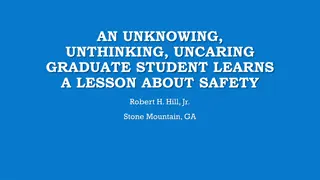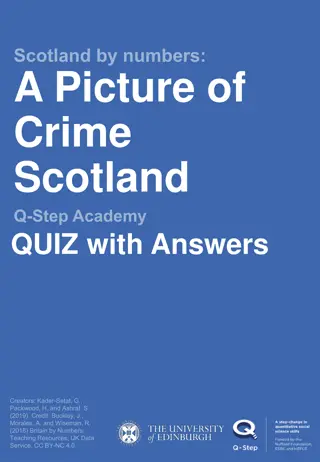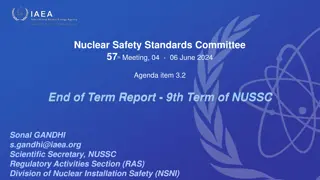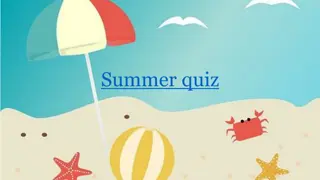Online Safety Quiz: How Secure Are You Online?
Test your knowledge on online safety with this informative quiz covering topics like creating secure passwords, recognizing online threats, and dealing with unfamiliar online contacts. Learn valuable tips to enhance your online security and protect your personal information from cyber threats.
Download Presentation

Please find below an Image/Link to download the presentation.
The content on the website is provided AS IS for your information and personal use only. It may not be sold, licensed, or shared on other websites without obtaining consent from the author. Download presentation by click this link. If you encounter any issues during the download, it is possible that the publisher has removed the file from their server.
E N D
Presentation Transcript
STOP. THINK. CONNECT. Online Safety Quiz
Question 1: When you create passwords, you should make them easy to guess. (True or False)
Answer 1: FALSE. Passwords should be: Easy to remember, but HARD to guess. Long, strong and unique. A combination of upper and lowercase letters, numbers and symbols. Different for each account.
Question 2: You don t have to worry when you visit your favorite sites because they are safe from spyware, malware and other online threats. (True or False)
Answer 2: FALSE. Trusted sites can be safer. But, what you do on those sites like clicking links can put you at risk. Keep a Clean Machine The latest operating system, software, web browser, anti-virus protection and apps on your computer and mobile devices. When in doubt, throw it out! Links in email, tweets, posts, and online advertising are one way cybercriminals infect your computer.
Question 3: When online, you should be careful whenever someone new sends you messages or asks for info about you. (True or False)
Answer 3: TRUE. Always be on the lookout for online pretenders! They may try to get information from you or about you. Think before you act. Be careful if you are asked to do something right now, if you re offered something that sounds too good to be true, or if someone asks for personal information.
Question 4: You get an email from a person who says he s your friend John. He wants to meet in the park after school. Should you: A. Tell your parents or guardian about the email and ignore the invite. B. Ask the person a question only John would know to make sure it s John. C. Go to the park and meet John.
Answer 4: A . Tell your parents or guardian about the email and ignore the request. Some people will pretend to be other people - maybe even someone you know. It s better to be safe than sorry! Let your parents know and let them help you make the right decision about contacting John.
Question 5: You should always know who you re talking to online. (True or False)
Answer 5: TRUE. The Internet is a fun place to talk with friends, but just because you meet someone online doesn t mean you know who they really are. A friend is someone you have met in person.
Question 6: You and a friend are on your computer, trying to download music and movies. You should: A. Go to a site that your friend uses and download a few files onto your computer. B. With mom and dad s OK, go to trusted websites or app stores to download music and movies.
Answer 6: B.With mom and dad s OK, go to trusted websites or app stores to download music and movies. Your friends may not know what websites are safe or unsafe for you to download.It s illegal to download music or movies from certain websites.
Question 7: It s okay to download FREE music from music sharing sites, as long as no one finds out. (True or False)
Answer 7: FALSE. It s the same as stealing from a store and you re stealing from your favorite artists as well! Some file sharing sites are have malware that can infect your computer. What you do online has the potential to affect everyone at home, at work and around the world. Practicing good online habits benefits the global digital community.
Question 8: You and your parents have rules for when you use the Internet. You re at a friend s house and decide to use the internet. Should you: A. Do everything your friend does online, because you re at his house? B. Respect your parents rules, even at a friend s house. C. It doesn t matter. You can t get in trouble because your parents will never find out!
Answer 8: B. Respect your parents rules, even at a friend s house. Your parents are trying to teach you good online habits with all the devices you use, even if they are not your own.
Question 9: You are playing a game on a smartphone and the app asks for your current location. It s okay to enable location services because all your friends play the same game. If they do it, it must be okay. (True or False)
Answer 9: False. Think before you app. Many apps don t need location services turned on to work. Opt-out of the location service feature. If you don t know how, ask your parents. Protect your personal information by getting a parent to read the privacy policy of an app before you download it.
Question 10: Jessica s friend Sophie asks for Jessica s password. What should Jessica do? A. Give Sophie her password. Sophie is her friend and Jessica can trust her. B. Tell Sophie her password and then change it as soon as she gets home. C. Don t give her password to Sophie.
Answer 10: C. Don t give her password to Sophie. Protect your personal info. Don t share passwords with shared with anyone except a parent or guardian or possibly a teacher. You don t have to do everything your friends do. If it doesn t feel right, say so.
Question 11: After a disagreement at school, a group of kids send Jaedon threatening messages online. What should he do? A. Block the kids from his page. B. Keep the emails and comments. C. Tell his parents. D. All of the above.
Answer 11: D. All of the above. If you re being bullied or harassed online, tell a parent or a trusted adult. Ignore and block the person and save all the messages.
Question 12: When you are connected to the Internet, you are responsible for your actions. (True or False)
Answer 12: True. Remember to STOP. THINK. CONNECT. Be careful, understand the consequences of your actions and behaviors, and enjoy the Internet. Remember, we all share the Internet. When you are safer online, you make the Internet more secure for everyone!
The End For more online safety tips, visit stopthinkconnect.org
